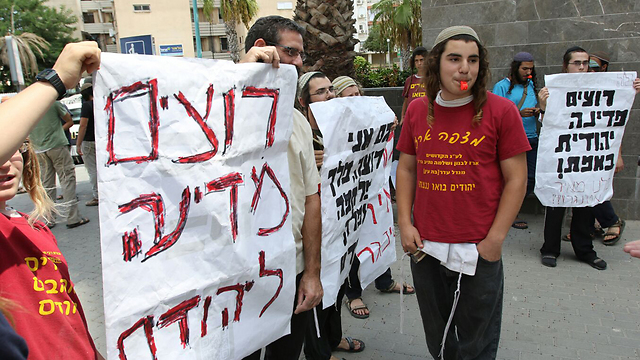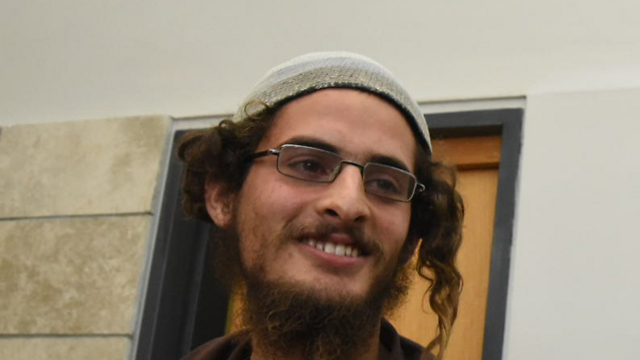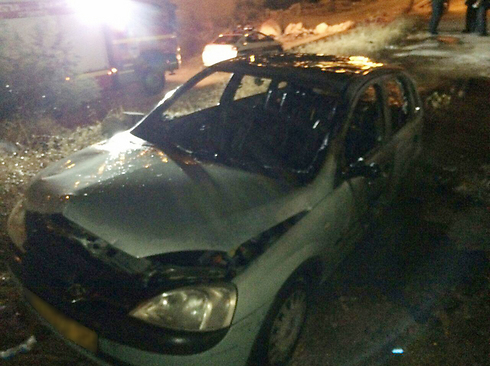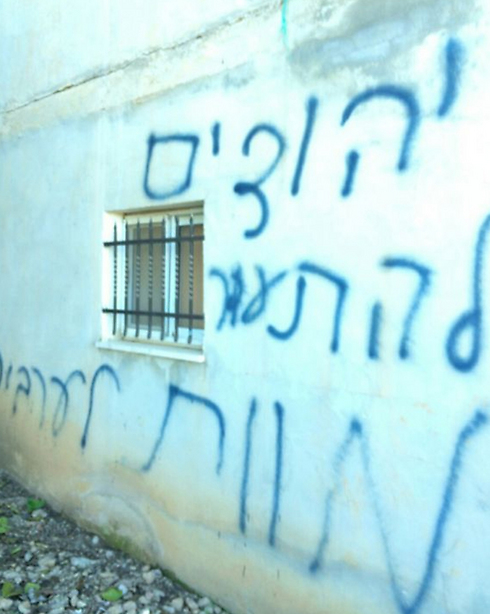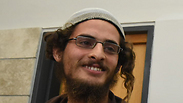
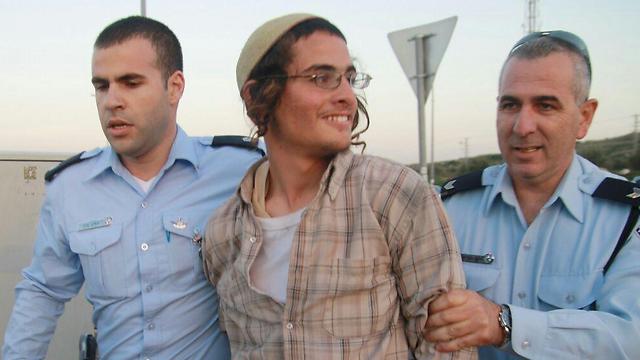
Meir Ettinger: The face of Jewish terrorism
The Shin Bet describes him as a central figure in Jewish terrorism, 'a violent and dangerous ideological criminal,' while his friends tell of a quiet and pleasant young man who became a leader merely because of his writing skills; somewhere on the way, between the outposts he's been living in since he was 15, to his administrative detention following the Duma murders, Rabbi Meir Kahane's grandson has formed a radical and anti-Zionist ideology.
From the top of the old cemetery in Safed, where the Ramak, Rabbi Moses ben Jacob Cordovero, is buried, we look down at the grave of Ha'ARI Hakadosh. Ha'ARI, Rabbi Isaac Luria, was one of the most prominent of Safed's kabbalists, a great scholar in both Torah and Kabbalah. When we visited his grave on Tuesday evening, we found a big group of yeshiva students and young men with large crocheted kippahs and wavy payot, who were loudly reading psalms. The sun has already disappeared behind Mount Meron, and a teeth-chattering Galilee cold took hold of everyone and would not let go.
The holy city upon the mountain is a mystical magnet not just to Hassidism and believers from all over the country; it also serves as a place of gathering to hilltop youth from the West Bank. Two days after the arson at the Palestinian village of Duma, Meir Ettinger was arrested in Safed. Ettinger was considered by the Shin Bet as the number one target of the agency's Jewish Division, the "ideological director" of the perpetrators of Jewish terror attacks, the one who charts the way the wind would blows and pours in Halachic arguments to justify it, which he bases on the writings of rabbis.
Ettinger came to the northern city about ten months ago, after the Shin Bet slapped him with an administrative order barring him from entering the West Bank and Jerusalem. The city plays and has played host, on and off, to others who received similar orders.
"They come and go," one of the residents of the old city tells us. "They come to get strengthened at the graves of the righteous that are scattered around this area. No one asks them what they are doing, where they came from and why. Safed takes everyone in: The broken hearted, the weirdos and yes, the radicals as well."
Two weeks have passed since a "dramatic development" was announced in the investigation of the murder in Duma. It is still unclear what the results of the investigation led by the Shin Bet and the Nationalistically-Motivated Crimes Unit at the Judea and Samaria Police Department will be, but Ettinger's fingerprints are all over this affair. Ettinger, 24, the grandson of Rabbi Meir Kahane, founder of the Kach movement, has been in administrative detention since August.
He has never given any interviews to the media. Instead, he lays out his ideology on his blog on "The Jewish Voice" website, which is run from Yitzhar in the Samaria district of the West Bank. His family and friends claim he has never been involved in any terror activity, but if the Shin Bet's claims are true - then Ettinger is the undisputed leader of the hilltop youth and "price tag" criminals.
Sleeping side by side
At first, Ettinger appears to be an anti-hero. His shoulders slumped, his voice quavering with hesitation. The last person who should be marked as the main target of the Jewish Division in the Shin Bet. But his strength, which could be glimpsed in his sparkling eyes, is in his intellectual prowess and remarkable expression abilities, mostly in writing.
"The man leaves no impression, he is the opposite of charismatic," says a lawman who spoke to Ettinger in the past year. "But when you start talking to him, you discover a very sharp young man, with extensive Torah knowledge, who talks to you about Jewish philosophy on a level that surpasses anyone his age."
"Meir has attracted public attention and has been marked by the Shin Bet not because he was involved in terror activity, but because of his blog on the Jewish Voice website," claims Neriya Ofan, a resident of Yitzhar, who has also been slapped with administrative orders banning him from the West Bank several times in the past. He knows Ettinger from working together at the Avoda Ivrit ("Jewish Labor") center, which advertises professionals and businesses that do not employ Arabs.
"His forte is writing. Those who have the power of expression in writing become, in today's reality of the internet and Facebook, the leading force. Those who have the power of writing, basically have everything. And that's why Meir Ettinger is a leader."
He is one of the 12 children of Mordechai Ettinger, the rabbi of the Har Hamor and Ateret Cohanim yeshivot, and Tova, the daughter of Rabbi Meir Kahane. Ettinger grew up in the neighborhood of Kiryat Moshe in Jerusalem, but when he was in high school he pulled away from his parents' home and started wandering the hills. He replaced the ideology that attributes holiness to the State of Israel, which he learned in his father's home, with the reverse ideology, closer to his grandfather's worldview. But while Meir Kahane was a Zionist who supported the State of Israel, his grandson, born a year after he was murdered and named after him, believes the State of Israel must be destroyed, or, in his own words - to be gently dismantled.
"The idea of the revolt is very simple," Ettinger wrote in his blog. "The State of Israel has many 'weak points', subjects people tiptoe around so as not to cause riots. What we will do is simply 'spark' all these powder kegs, all the questions and contradictions between Judaism and democracy. Between the Jewish character and the secular character, without fearing the consequences. Disrupting the ability to govern the country. That's the main part of the revolt's 'vort' (word) to break the rules and the entire status quo.
"When you do this, you have to pay attention to the difference between 'breaking' the state, which is an action that doesn't pay enough attention to what is left of the fragments, and 'dismantling,' which is the same action, only gentler and particularly careful. That is, ultimately the goal is shaking the foundations of the state to the point where the Jews are forced to decide whether they want to take part in the revolution or in suppressing the revolt, because it will not be possible to ignore it or continue to sit and do nothing, because in practice, the revolt will not permit the state's continued existence in the same way."
The first outpost Ettinger moved to at the age of 15 was Shvut Ami, near Kedumim. Later, he was one of the main members of the Ramat Migron outpost. He then founded the Maoz Esther outpost, followed by the Geulat Zion outpost in the Shiloh Valley. The person who was with him every step of the way, and turned into his closest friend, is Amishav Melet.
"We slept side by side, in Shvut Ami and in Ramat Migron," says 24-year-old Melet. "We'd sit together by the fire with a guitar, talk, tell stories, sing. We also spent a lot of weekends together. We were all over the outposts of the Binyamin region. When I got married, three years ago, we founded Geulat Zion and Ettinger moved near us as a bachelor. After Ettinger got married, he moved to Givat Ronen near Har Brakha and then he got an administrative order barring him from Judea and Samaria, and he moved to Safed. Four months ago, I also got an order like that. Since then, among other decrees, I'm not allowed to talk to him."
It's difficult to keep in touch with such a series of arrests and restraining orders, no?
"It's difficult, but merely challenging. But the more they afflict us, the more we will multiply and the more we will spread abroad. The more hardships, the stronger the friendship becomes. All of the members of the hilltop youth feel very close, precisely because they are prevented from meeting each other."
Despite their close friendship, Melet clarifies, there are ideological differences between him and Ettinger. "Meir went in a more Hassidic direction. I feel less of a connection to the Hasidic movement and don't view it as a way of life. We also disagree on the attitude towards the State of Israel. I see the state as a tool, one that can do good and also bad. I think the way in which the State of Israel treats the land of Israel is rotten. But maybe from this decay something new will spring. Meir rejects the State of Israel. He believes it is a stumbling block to everything that is holy, like the land of Israel, Shabbat, and Judaism. And in his opinion this stumbling block must be moved. This is what he puts on the table, thanks to his great ability of expression, to try to convince everyone. He knows how to express his ideas and that's why the Shin Bet wants to shut him up."
An aspiring builder
In September of 2011, Ettinger received an administrative order banning him from the West Bank "for security reasons" and moved to Jerusalem. Two months later, the Jerusalem Magistrate's Court, to the police’s request, issued an order banning him from the Mahane Yehuda Market area, after he was arrested when mapping businesses that employ Arabs in order to "warn the customers of those businesses." Later that year he was arrested again, this time as part of the "spy affair," in which he was charged, along with four others from Yitzhar and the surrounding hills, with setting up an "operations room" in an apartment in Jerusalem to monitor IDF movements in the territories and warn settlers in the outposts of impending evacuations. He was put on house arrest at his grandmother's house in Jerusalem, and arrested again when he violated the terms of his arrest. Then he was imprisoned for several months while his trial was ongoing.
Supreme Court Judge Yitzchak Amit, who presided over one of the appeals filed by the defendants in the “spy affair,” wrote in his ruling: "This isn't Hasamba (a series of books about a group of children from Tel Aviv assisting the underground Haganah organization in the struggle for Israeli statehood - ed.) fighting against the British army and Elimelech Zurkin (one of the villains in the books - ed.), but an organized and sophisticated activity against the IDF and other state bodies, while using Trojan horses inside the army." Ettinger was convicted of conspiring to gather information of military value and sentenced to half a year in time served.
He is married to Moriah, who was raised on the Shiloh hills and is now a student of Israel Studies in the Herzog College in Alon Shvut. After their marriage, the couple lived in Givat Ronen (Sneh Ya'akov), an outpost on a hill near Har Brakha. Before he was arrested, their livelihood came from the odd job Meir would do and they lived frugally. When the lawman who spoke to him asked him why he's not studying to become a rabbi, Ettinger said: "The people of Israel are not lacking in rabbis, but they are lacking in working hands. I aspire to become a builder."
However, his friend Melet says Ettinger was not gifted with technical abilities. "He has two left hands. Meir is the kind of guy that you give him a book and he doesn't need anything more. He already finished reading the Shisha Sedarim (Six Orders of Mishnah and Talmud – ed.) several times. It's not that he didn't also help to physically build structures at outposts, but he doesn't have technical abilities. He's more of a man of ideology than a man of action. He thinks we need to do, not talk. He's a joyful believer that you can learn how to follow the truth from."
Some said he was introverted and a recluse.
"He's not introverted and not a recluse. He's vibrant and happy, a guy with a heart of gold, caring, always helps everyone. If, let's say, someone was hit in the face with pepper spray during one of the evacuations, (Ettinger) would have helped him to a cistern to wash his face."
How significant was his grandfather to him?
"Among all the books he learned from, he also learned from his grandfather's books. You could say his grandfather is a significant figure in his life, but he's not following the exact same path."
When Ettinger was arrested four months ago, a security official in the West Bank told us that he very quickly became a dominant figure among the hilltop youth. He stood out not just for his ideological beliefs, but also for his actions. For example, he was seen by security forces stoning sheep belonging to an Arab shepherd, and then slaughtering one in front of the shepherd. "It was terrifying," said the security official. "He was possessed with some sort of madness."
Several months later, in January 2014, Ettinger arrived at the Palestinian village of Qusra with a group of other settlers, all of them masked and gloved, apparently planning to commit a price tag attack. However the residents caught them and beat them to a pulp. The village elders protected them from the wrath of the youth, and saved them from being lynched. They also called for the IDF to come and extract the settlers from the village.
On November 23, 2014, the Kumail family home in Khirbet Abu Falah near Ramallah was set on fire. The house was seriously damaged, but no one was hurt. Three months later, Ettinger was arrested by the detectives of the Nationalistically-Motivated Crimes Unit in the Judea and Samaria Police and taken for questioning at the Ma'ale Adumim police station on suspicion he was involved in the arson. The police had no evidence against him, only intelligence. As is his custom, Ettinger remained silent during his interrogation, following which he was slapped with an administrative order barring him from entering the West Bank.
He appealed the order to the Supreme Court. Before the judges even made a decision on the case, Ettinger wrote them a letter.
"Two weeks ago, I received an order barring me from my home in Givat Sneh Ya'akov near the holy city of Shechem (Nablus -ed.). This order forces me to leave my home, the righteous Jacob's land; my parents’ house in the holy city of Jerusalem, the city of the Temple; and my in-laws' house in Shiloh, where the Tabernacle resided thousands of years before the strange and bizarre laws that this court adheres to were made," he wrote.
"Unfortunately, the Land of Israel is dominated by a government that is not loyal to the laws of Torah and the commandments, for which the sanctity of the Land of Israel is foreign, and the fact it is called a Jewish state is merely lip service. This is the situation that brought me to stand here, in front of this court, that in my eyes is the same as those who are barring me from my home and the land of my ancestors, whose goal is to promote assimilation and erase the unique nature of the people of Israel, and to whom the state's security is not the same as the security of Jews."
His appeal was rejected and the order remained. The Ettingers moved to Yad Binyamin near Gedera, then moved in with relatives in Petah Tikvah and eventually moved to Safed.
The sorrow of rearing sons
Now we are on Mordechai Anielewicz Street, in the southern neighborhood of Safed. From the street where Meir and Moriah Ettinger resided we can see a view of the Kinneret with thick gray smoke hovering over it. When we arrived there in the early evening hours, one of the neighbors told us the Ettingers lived next door to Rabbi Ezra Scheinberg, who was, up until six months ago, the head of the Orot HaAri yeshiva. "Ettinger prayed at his yeshiva," the neighbor said. "In general, quite a few hilltop youth would come there."
Scheinberg was arrested at the beginning of last summer on suspicion of committing sexual offenses on women and was charged with rape, sodomy, incident acts and sexual harassment. He is currently under arrest.
In early August of this year, after the arson at the Dawabsheh family home in Duma, Ettinger was arrested again and put on a six-month administrative detention. In the arrest order he is described as "the philosopher and director of the terror group behind the arson of Palestinian homes and of churches." The arrest order further stated that Ettinger's organization's goal is to overthrow the government of the State of Israel by means of a violent revolt and form an alternative rule, expel from Israel anyone who is not Jewish, eradicate idol worship, and violate the Temple Mount. The decision to put him on administrative detention is based on confidential Shin Bet documents, according to which if Ettinger is not put on administrative detention, he would continue working to realize his goals.
During a hearing about his administrative detention at the Jerusalem District Court, Ettinger mocked his classification as "the Shin Bet's number one target" in a letter he filed to the court. "I could not, in this short letter, address all of the reports in the media," he wrote, "I will only tell of an anecdote that, according to these reports, I am the Shin Bet's number one target, but the Shin Bet investigators did not know that for six months now I’ve only had one sidecurl after the other one was ripped off in a work accident while working in the construction of the land of Israel."
During his detention he went on a hunger strike after the Shin Bet barred him from talking to his wife and family. Because of the hunger strike, which lasted for several days, he was allowed to contact his family. "We are of course keeping in touch with him," says his father, Rabbi Mordechai Ettinger, "but we don't want to be a part of this entire story of the arrest. We don't want to give interviews. Our rabbis instructed us not to give interviews." His mother Tova told Ynet after her son was arrested: "I don't have the energy for this anymore." Wife Moriah refuses to give interviews.
"Meir's parents follow Rabbi Tau (Rabbi Zvi Tau, one of the more important rabbis in the national-religious sector - YE, OS), meaning they are big supporters of the state," Melet explains. "There's 'in sorrow you will rear sons,' and there's 'in sorrow you will rear parents,' and each side needs to work on their nature. It's not simple."
Melet himself was barred from his home in Geulat Zion. He lives with his wife and son in his parents' home in Hermesh and is not allowed to leave the house at nighttime. "I think the Shin Bet gave me that order for no reason," he claims. "Officially, the order says something laconic like 'suspicion of harming the Arab population and security forces,' but the Shin Bet specifically told me everything that is written in the order is nonsense and that I have nothing to do with violence or price tag attacks. They made it clear to me that I was banned because I teach the future generation of hilltop youth to love the land of Israel. Over the summer I organized a summer camp about the land of Israel. We learned from both the Torah and the writings of Ben-Gurion."
As an educator, what did you tell your students about the murder in Duma?
"I only talk to my students about the land of Israel. I also believe in universal values like vegetarianism, for example, but I don't talk to my students about it. And just like I don't talk to them about vegetarianism, I won't talk to them about Duma. But if someone was to tell me they wanted to burn down a house in Duma, I'd tell him it was a shame to burn down houses Jews could live in."
Why didn't you and Meir enlist in the IDF, like other hilltop youth?
"Those who enlisted were just punks, not real hilltop youth. Meir doesn't believe in the military. I don't have any fundamental objection to the military, but I thought I could do better things outside the military, and the military also didn't want me. The military is as its name implies, the Israel Defense Force, it only knows how to defend, not conquer and fight. It acts like the UN's military. The state needs to decide what side it's on, whether it wants to have a Jewish state here or a state for all. If it wants a Jewish state, we could work together, but if it's a state that blurs out the Jewish identity, then there will be war here."
Ettinger's attorney, Yuval Zemer, says one of the rationales behind the administrative detention order is the claim he violated the restrictions placed on him as part of the administrative restraining order. "He was put in house arrest at night and had to report where he was sleeping, and in all of the times he was supposedly violating those restrictions, we proved with recordings that he did call the police station to report where he was sleeping. The Shin Bet representatives also claimed that he met with Moshe Orbach in Safed, even though he was barred from meeting or talking to him. There was no evidence such a meeting took place, but in the request for the administrative detention order, this meeting was presented as a fact to establish the claim that he cannot be freed because he violates the administrative restrictions placed on him."
Moshe Orbach also arrived in Safed because of an administrative restraining order. Orbach, 24, originally from Bnei Brak, dropped out of school and moved to the Baladim outpost near Kokhav HaShahar. After he was barred from the West Bank, he started attending the Nahalat Naftali Yeshiva in Safed's old city.
He was arrested at the end of July this year as part of the investigation into the arson of the Church of Multiplication near the Kinneret. In his possession was a USB drive with a document titled "The Kingdom of Wickedness," a guide detailing how to commit price tag attacks without getting caught, which reviews all means at the police and Shin Bet's disposal. These 13 pages, which serve as a tactical intelligence document, are actually an explanation on how to create an operative terror infrastructure.
‘My heart has been set aflame’
Besides Ettinger, there are two other hilltop youth that are currently placed in administrative detention. Forty others have received administrative orders barring them from the West Bank and placing different restrictions on them. Many in the settlements protest the ease with which such orders are issued, and even more so - the public's silence on the matter.
"I have no idea why Meir Ettinger was put in administrative detention," says Rabbi Meir Goldmintz of the Havat Gilad Yeshiva, who spoke to Ettinger many times in the past. "This is the essence of an administrative detention - detention without a trial, without clearly defined guilt, and without the detainee having the right to defend himself against the accusations that may have been made against him, and that is why this is an act of injustice, the violation of human rights, an act against the democratic nature of the State of Israel.
"Ettinger and I had a profound discussion on the role of the State of Israel. Meir always presented his views in a calm and pleasant manner, and despite the fact I'm a Zionist and I oppose his views, the freedom of speech is precisely there to protect the expression of those who oppose you. How can a mass arrest, in which 40 people are detained at once, happen? Even if there are two there who might have been involved in the fire in Duma, then this is still an injustice done to 38 others."
"There is no evidence linking Ettinger to a violent incident against Arabs, but the first clause of the request for an administrative detention order said that 'he is a violent and dangerous ideological criminal,'" claims Ettinger's lawyer, Zemer. "The request to renew the administrative detention order said that 'this is one who, despite his administrative detention, still holds the same radical views.' This is the purpose of the arrest, reeducation like in North Korea. I told Judge Avraham Tal, the president of the District Court, 'look at this, the reeducation failed. Perhaps we should send him to North Korea, they are experts on this."
The Shin Bet said in response: "The administrative detention order issued against Meir Ettinger was approved by all of the authorized parties as well as by the president of the District Court, having reviewed all of the information attributed to the matter. Ettinger's administrative detention is based on comprehensive and reliable information indicating a real danger to state security and to the public."
Zemer was not convinced by this response. "Ettinger is in detention for his views, his ideology. This is 100 percent a political detention. I complained to the judges that I only receive two pieces of paper, while the Shin Bet representatives come to court with 20-30 folders that they claim are filled with classified information. It cannot be that all of the material is classified. I asked the court to see what can be given to me and after a review of the matter they gave me a folder full of posts Ettinger made on his blog on The Jewish Voice. This is material initially presented as classified and secret, material that is available to all online. This is ridiculous."
This, for example, is what Ettinger wrote about the arson at the Church of the Multiplication: "What fire trucks could put out this raging fire that will set a spark in the heart of one Jew? There is hope, there is a chance, do not despair. My heart has been set aflame, what about you? Light it up quickly, before they can put us out."
And a day before the terror attack in Duma he wrote: "There is no terror organization, but there are a lot of Jews, a lot more than some think, whose values are completely different to those of the Supreme Court or the Shin Bet, and who are bound not by the laws of the state - the broken ignorance - but laws far more eternal and true, from the wellspring."















